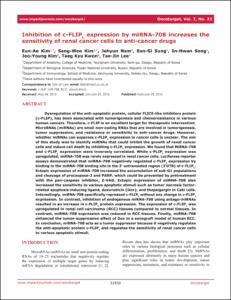Inhibition of c-FLIPL expression by miRNA-708 increases the sensitivity of renal cancer cells to anti-cancer drugs
- Affiliated Author(s)
- 권택규
- Alternative Author(s)
- Kwon, Taeg Kyu
- Journal Title
- Oncotarget.
- ISSN
- 1949-2553
- Issued Date
- 2016
- Keyword
- c-FLIP; miR-708; RCC; Doxorubicin
- Abstract
- Dysregulation of the anti-apoptotic protein, cellular FLICE-like inhibitory protein
(c-FLIP), has been associated with tumorigenesis and chemoresistance in various
human cancers. Therefore, c-FLIP is an excellent target for therapeutic intervention.
MicroRNAs (miRNAs) are small non-coding RNAs that are involved in tumorigenesis,
tumor suppression, and resistance or sensitivity to anti-cancer drugs. However,
whether miRNAs can suppress c-FLIPL expression in cancer cells is unclear. The aim
of this study was to identify miRNAs that could inhibit the growth of renal cancer
cells and induce cell death by inhibiting c-FLIPL expression. We found that MiRNA-708
and c-FLIPL expression were inversely correlated. While c-FLIPL expression was
upregulated, miRNA-708 was rarely expressed in renal cancer cells. Luciferase reporter
assays demonstrated that miRNA-708 negatively regulated c-FLIPL expression by
binding to the miRNA-708 binding site in the 3’ untranslated region (3’UTR) of c-FLIPL.
Ectopic expression of miRNA-708 increased the accumulation of sub-G1 populations
and cleavage of procaspase-3 and PARP, which could be prevented by pretreatment
with the pan-caspase inhibitor, Z-VAD. Ectopic expression of miRNA-708 also
increased the sensitivity to various apoptotic stimuli such as tumor necrosis factorrelated
apoptosis-inducing ligand, doxorubicin (Dox), and thapsigargin in Caki cells.
Interestingly, miRNA-708 specifically repressed c-FLIPL without any change in c-FLIPs
expression. In contrast, inhibition of endogenous miRNA-708 using antago-miRNAs
resulted in an increase in c-FLIPL protein expression. The expression of c-FLIPL was
upregulated in renal cell carcinoma (RCC) tissues compared to normal tissues. In
contrast, miRNA-708 expression was reduced in RCC tissues. Finally, miRNA-708
enhanced the tumor-suppressive effect of Dox in a xenograft model of human RCC.
In conclusion, miRNA-708 acts as a tumor suppressor because it negatively regulates
the anti-apoptotic protein c-FLIPL and regulates the sensitivity of renal cancer cells
to various apoptotic stimuli.
- Department
- Dept. of Immunology (면역학)
- Publisher
- School of Medicine
- Citation
- Eun-Ae Kim et al. (2016). Inhibition of c-FLIPL expression by miRNA-708 increases the sensitivity of renal cancer cells to anti-cancer drugs. Oncotarget., 7(22), 31832–31846. doi: 10.18632/oncotarget.7149
- Type
- Article
- ISSN
- 1949-2553
- Appears in Collections:
- 1. School of Medicine (의과대학) > Dept. of Immunology (면역학)
- 파일 목록
-
-
Download
 oak-2016-0127.pdf
기타 데이터 / 4.77 MB / Adobe PDF
oak-2016-0127.pdf
기타 데이터 / 4.77 MB / Adobe PDF
-
Items in Repository are protected by copyright, with all rights reserved, unless otherwise indicated.